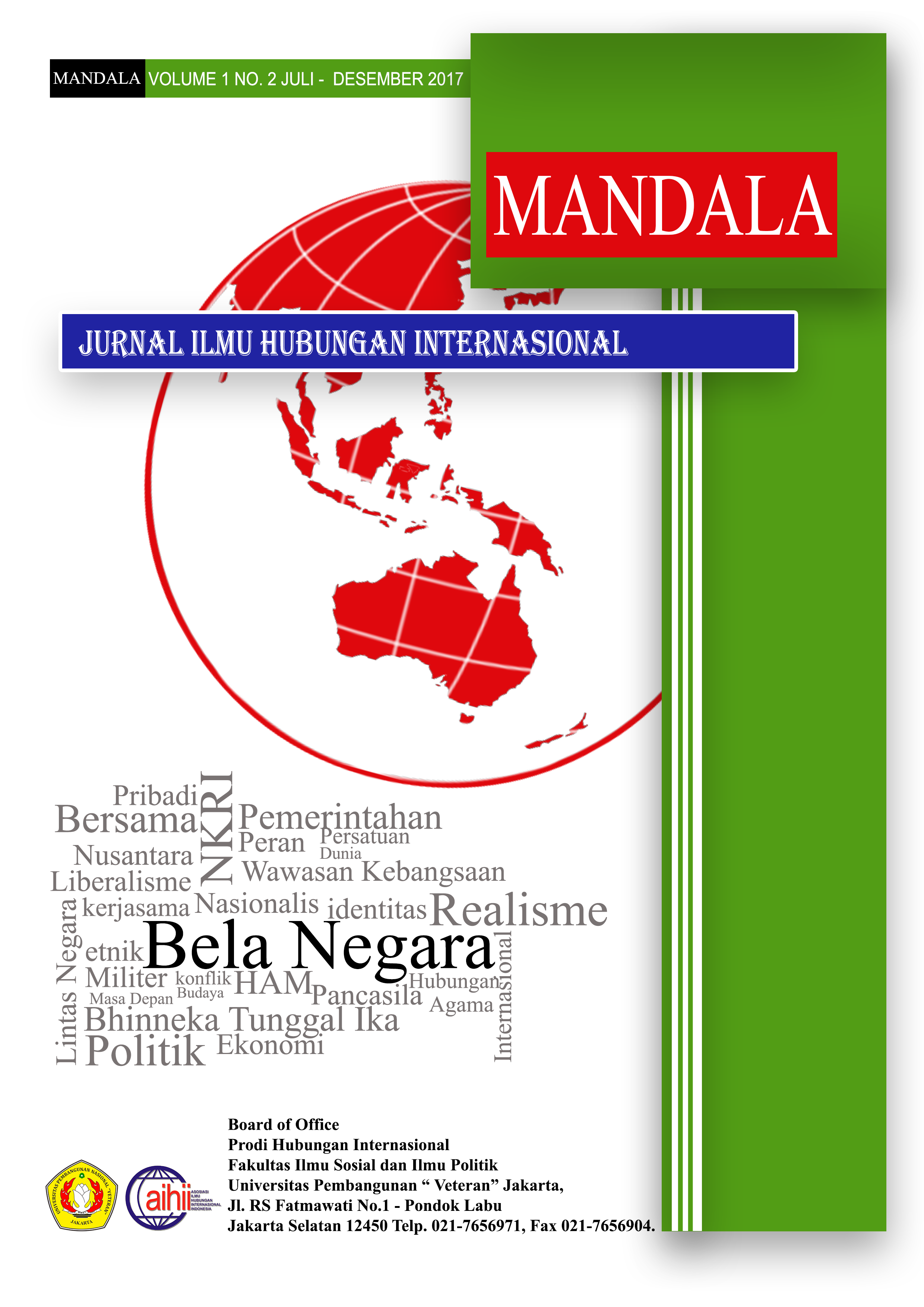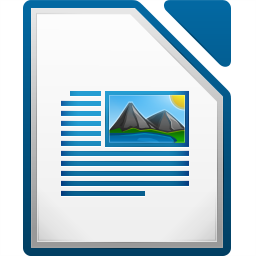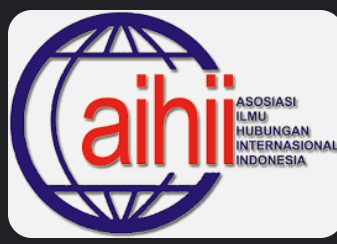PERAN MEDIA MASSA DALAM POLITIK LUAR NEGERI: KASUS DI INDONESIA
DOI:
https://doi.org/10.33822/mjihi.v2i1.994Keywords:
Mass Media, Foreign Policy, CNN Effect, Manufacturing Consent, Indonesia, Iran Nuclear, United Nations Security Council.Abstract
As a country embraces democratic values in its political system, mass media has an increasing role in influencing government policy making including foreign policy making. Study on mass media relations with foreign policy making has developed to level conceptual even theoretical framework in mass communication study. This article shows that theoretical and analytical approaches toward media and foreign policy decision making have at least seven analytical frameworks. Those tools of analysis are CNN Effect, the Indexing Hypothesis, Media – Policy Interaction Model, Positioning Theory Agenda – Setting Theory, Propaganda Model dan Manufacturing Consent. In Indonesia, study on relations between media and foreign policy has not been developed. But there is prominent case in foreign policy change of Indonesia regarding Iranian nuclear issue in United Nations Security Council.
References
Referensi
Anwar, Dewi Fortuna. 1994. Indonesia in ASEAN: Foreign Policy and Regionalism. Singapore: Institute of Southeast Asian Studies.
Anwar, Dewi Fortuna. 2010. “The Impact of Domestic and Asian Regional Changes on Indonesian Foreign Policy”. Southeast Asian Affairs, pp. 126-141.
Anwar, Dewi Fortuna. 2010. “Foreign Policy, Islam and Democracy in Indonesia”. Journal of Indonesian Social Sciences and Humanities Vol. 3, pp. 3754.
Alden, Chris and Amnon Aran. 2017. Foreign Policy Analysis: New Approaches. London: Routledge.
Al-Anshari, Mohamad Zakaria. 2016. The Role of Islam in Indonesia's Contemporary Foreign Policy. Thesis Victoria University of Wellington.
Baastø, Siri Sveinsdotter. 2013.The Media and Foreign Policy: A Study of the Media's Role in The Intervention in Libya (2011). Thesis di The Department of International Environment and Development Studies, Norwegian University of Life Sciences (UMB).
Brody, Richard. 1994. “Crisis, War and Publik Opinion: The Media and Publik for the President”. In W. Lance Bennet and David Paletz eds., Taken by Storm, Publik Opinion and U.S. Foreign Policy in the Gulf War. Chicago: University of Chicago ress.
Bennet, W. Lance. 1990. “Toward a Theory of Press-State Relations in the United States”. Journal of Communication 40: 103-25.
Baum, Matthew A. and Philip B.K. Potter. 2008. “The Relationships Between Mass Media, Public Opinion, and Foreign Policy: Toward a Theoretical Synthesis”. The Annual Review of Political Science.
Breuning, Marijke. 2007. Foreign Policy Analysis: A Comparative Introduction. New York: Palgrave Macmillan.
Buckley, B.1998. The News Media and Foreign Policy: An Exploration. Halifax, NS: Centre for Foreign Policy Studies, Dalhousie University.
Chong, Alan. 2007. Foreign Policy in Global Information Space Actualizing Soft Power. New York. Palgrave Macmillan.
Christopoulou, Niki. 2011. The Impact of media on the Formulation of Foreign Policy in Turkey and Greece 2004-2011. Thesis di Institute of Social Sciences, Istanbul Bilgi University.
Clarke, Michael and Brian Whites (eds) 1995. Understanding Foreign Policy: The Foreign Policy System Approach. Hants: Edward Elgar Publishing Limited.
Cutler, Lloyd N. 1984. “Foreign Policy on Deadline”. Foreign Policy 56: 113-28.
Dosch, Jörn.2006. “The Impact of Democratization on the Making of Foreign Policy in Indonesia, Thailand and the Philippines.” Dalam Journal of Current Southeast Asian Affairs 25 (2006), 5, pp. 42-70.
Entman, Robert. 1993. “Framing: Clarification toward a Fractured Paradigm”. Journal of Communication, 43:4 (1993), 51-58.
Entman, R.M., 2004. Projections of Power: Framing News, Publik Opinion, and US Foreign Policy. Chicago: University of Chicago Press.
Gans, H.J. 2004. Democracy and the News. Oxford: Oxford University Press on Demand.
Gindarsah, Iis. 2012. “Democracy and Foreign Policy-Making in Indonesia: A Case Study of the Iranian Nuclear Issue, 2007–08.” Dalam Contemporary Southeast Asia: A Journal of International and Strategic Affairs Volume 34, Number 3, December 2012 pp. 416-437.
Gwarzo, Bello Basiru Gwarzo. 2014. “The Press and Foreign Policy: An Examination of the Role of the Nigerian Press in the Government Decision to Intervene in the Liberian Civil War in 1990”. Dalam American International Journal of Social Science Vol. 3, No. 3, May 2014.
Herman, Edward S.1985. “Diversity of News: Marginalizing the Oposition”. Journal of Communication 35:135-46.
Hein, G.R., 1986. Soeharto's Foreign Policy: Second-Generation Nationalism in Indonesia. Berkeley: University of California.
Hulme, Simon J. 2001. The Modern Media: The Impact on Foreign Policy. Thesis di Fort Leavenworth, Kansas.
Kusmawati, Flori Bertha Ratna.2008.Kontroversi Sanksi Dewan Keamanan PBB ke Iran dalam Pemberitaan Pers Indonesia.Skripsi di Program Studi Ilmu Komunikasi, FISIP, Universitas Atma Jaya Yogyakarta.
Krisnayuzar, Galuh Adityo. 2010. Peranan Diplomasi Indonesia sebagai Anggota Dewan Keamanan PBB pada tahun 2007-2008 mengenai Program Nuklir Iran. Skripsi di Fakultas Hukum Universitas Lampung.
Livingston, Steven and Todd Eachus. 1995. “Humanitarian Crises and U.S. Foreign Policy: Somalia and the CNN Effect Reconsidered”. Political Communication 12: 413-29.
Ladan, B.M. 2015. The Impact of Mass Media on Nigeria’s Foreign Policy From 1999 to 2007. Lagos: Media.
Larson, James. 1988. Global Television and Foreign Policy. Headline Series #283. New York: Foreign Policy Association.
Marpaung, Timothy Daud Meilando. 2014. Peran Dewan Keamanan Perserikatan Bangsa-Bangsa (PBB) dalam Menyelesaikan Sengketa Nuklir Iran. Skripsi di Program Studi : Ilmu Hukum, Program Kekhususan: Hukum tentang Hubungan Internasional. Universitas Atma Jaya Yogyakarta.
Malek, A. 1997. News Media and Foreign Relations: A Multifaceted Perspective. New York: Greenwood Publishing Group.
Miller, D.B. 2007. Media Pressure on Foreign Policy: The Evolving Theoretical Framework. New York: Macmillan.
Mintz, A. and DeRouen Jr. K. 2010. Understanding Foreign Policy Decision Making. Cambridge: Cambridge University Press.
Msengwa, M.A., 1981. The News Media and Foreign Policy in International Relations. Centre for Foreign Relations.
Mermin, Jonathan. 1997. “Television News and American Intervention in Somalia: The Myth of a Media-Driven Foreign Policy”. Political Science Quarterly, Vol. 112, No. 3 (Autumn, 1997), pp. 385-403.
Mukrimin. 2013. “The Influence of Mass Media in Political Change in Indonesia”. POLITIKA: Jurnal Ilmu Politik, 3(2), pp.57-67.
Murphy, Ann Marie. 2008. “Indonesia Returns to the International Stage: Good News for the United States”. Dalam Orbis, Volume 53, Issue 1, January 2009, Pages 65–79.
Murphy, Ann Marie. 2012. “Democratization and Indonesian Foreign Policy: Implications for the United States”. Dalam Asia Policy, Number 13, January 2012, pp. 83-111.
Nabbs-Keller, Greta. 2013. “ Reforming Indonesia’s Foreign Ministry: Ideas, Organization and Leadership.” Contemporary Southeast Asia 35 No. 1 (2013): 56- 82.
Nacos, B.L., Shapiro, R.Y. and Isernia P. 2000. “Old or New Ball Game? Mass Media, Publik Opinion, and Foreign Policy in the post-Cold War World.” Decisionmaking in a Glass House: Mass Media, Publik Opinion, and American and European Foreign Policy in the 21st Century. Oxford: Rowman & Littlefield, pp.1-7.
Nugraha, Ekky. 2014. Dukungan Indonesia terhadap Resolusi DK PBB 1747 Tentang Program Nuklir Iran. Dalam eJournal Ilmu Hubungan Internasional, Volume 2, Nomor 2, 2014 : 401-410.
Nugraha, Dede. 2010. Konstruksi Pemberitaan Program Nuklir Iran (Analisis Framing pada Harian Republika dan Media Indonesia). Penelitian di Universitas Islam Negeri Syarif Hidayatullah.
Nicholas O. Berry. The Media and Foreign Policy in the Post-Cold War World. Freedom Forum Media Studies Center: Research Group.
Panagiotou, Nikos. 2003. The Role of Mass Media in Foreign Policy: The Case of Greek Press. Paper for 2nd LSE PhD Symposium on Modern Greece.
Palloshi, S. 2015. “The Influence of the CNN Effect and the Al Jazeera Effect on American Foreign Policy”. İLED, 2(2), pp.43-67.
Pahre, Robert (ed). 2006. Democratic Foreign Policy Making: Problems of Divided Government and International Cooperation. New York: Palgrave Macmillan.
Permana, Dana. 2009. Politik Luar Negeri Indonesia dan Dewan Keamanan PBB:Studi Kasus Peranan Indonesia dalam Penanganan Krisis Nuklir Iran di DK PBB Tahun 2006. Skripsi di Departemen Ilmu Politik, FISIP, Universitas Sumatera Utara.
Putri, Inggried Christhiansend Purnomo. 2011. “Tuntutan Publik Islam di Tingkat Domestik pada Masa Pemerintahan SBY (2004-2009) terhadap Kebijakan Indonesia atas Kasus Nuklir Iran.” Dalam Jurnal Studi Hubungan Internasional. Vol 1, No 1.
Priatna. P.L.E. (Direktur Informasi dan Media Kementerian Luar Negeri RI). 2012. Media, Opini, dan Hubungan Luar Negeri: Sinergi Informasi. Forum Bakohumas, Bogor.
Qodriyah, Khodijatul. 2008. Hubungan Diplomatik Iran-Indonesia: Studi Kebijakan Pengembangan Nuklir Iran dan Pengaruhnya terhadap Hubungan Diplomatik Iran-Indonesia 2005-2007. Tesis di Program Studi Kajian Timur Tengah dan Islam, Program Pascasarjana Universitas Indonesia.
Rajagukguk, Hosianna Rugun Anggreni. 2009. Sikap Kritis Parlemen terhadap Kebijakan Luar Negeri Indonesia dalam Kasus Resolusi DK PBB tentang Isu Nuklir Iran. Tesis di Universitas Indonesia.
Robinson, P.1999. “The CNN Effect: Can the News Media Drive Foreign Policy?” Review of International Studies, 25(02), pp.301-309.
Robinson, Piers. 2001. “Theorizing the Influence of Media on World Politics Modelsof Media Influence on Foreign Policy”. Dalam European Journal of Communication, Vol 16(4): 523–544.
Sulistyo, Djoko dan Irfa Puspitasari.2008. Sikap Indonesia dalam Dewan Keamanan PBB: Krisis Pembangunan Instalasi Nuklir Iran dan Reaksi Publik dalam Negeri. Lembaga Penelitian Universitas Airlangga.
Shaw and McCombs, “The Agenda-Setting Function of Mass Media”. Publik Opinion Quarterly 1972.
Robinson, Piers.2002. The CNN Effect: The Myth of News, Foreign Policy and Intervention. London: Routledge.
Serfaty, Simon. 1990. The Media and Foreign Policy. London: Palgrave Macmillan UK.
Soderlund, W.C. Nelson, R.C. and Briggs E.D. 2003. Mass Media and Foreign Policy: Post-Cold War Crises in the Caribbean. New York: Greenwood Publishing Group.
Sen, K. and Hill, D.T., 2006. Media, Culture and Politics in Indonesia. New York: Equinox Publishing.
Taylor, Philip M. 1997. Global Communications, International Affairs and the Media Since 1945. London: Routledge
Touri, Maria. 2006. Media - Government Interactions and Foreign Policy: A Rational Choice Approach to the Media's Impact on Political Decision-Making and the Paradigm of the Greek-Turkish Conflict. Disertasi di Institute of Communications Studies. The University of Leeds.
Thune, Henrik. 2009. Beyond the CNN Effect towards a Constitutive Understanding of Media Power in International Politics. Disertasi di Faculty of Social Sciences, University of Oslo.
Vatikiotis, M.R., 1993. Indonesia's Foreign Policy in the 1990s. New York: Contemporary Southeast Asia.
Wirajuda, Muhammad Hadianto. 2014. The Impact of Democratisation on Indonesia’s Foreign Policy: Regional Cooperation, Promotion of Political Values, and Conflict Management . Disertasi di The London School of Economics and Political Science.
Wirajuda, Hassan. 2008. Beyond the CNN Effect. Speech at At the Third Global Inter- Media Dialogue Nusa Dua, Bali, 7 May 2008.
Yang, Jackson Y.M. 2015. From Rowing Between Two Reefs to Sailing in Two Oceans: The End of “A Thousand Friends, Zero Enemies”? Thesis di Naval Postgraduate School, Monterey, California.
Yordanova, Tsvetelina. 2012. Media-International Relations Interaction Model. Sofia: Institute for Security and International Studies (ISIS).





